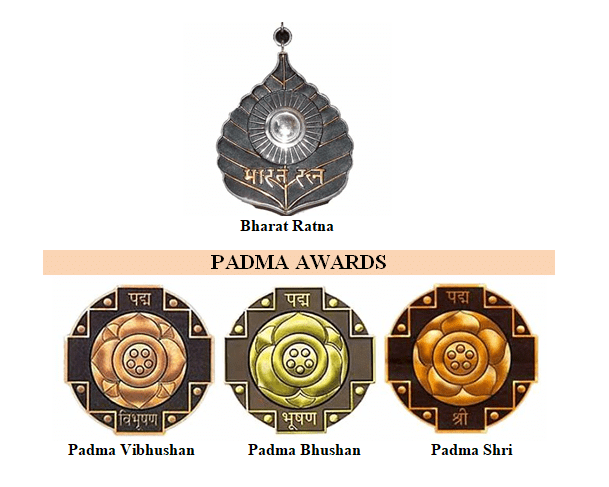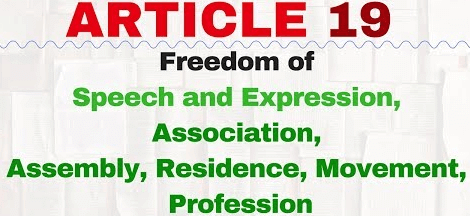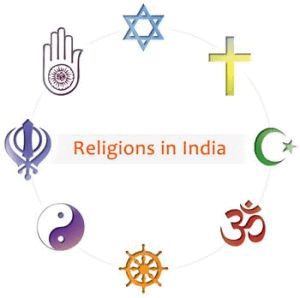Fundamental Rights- 2 | General Awareness & Knowledge - DSSSB TGT/PGT/PRT PDF Download
Right to Equality
- Articles 14 to 18 deal with the right to equality.
- Equality before law — Article 14 provides that "the state shall not deny to any person equality before the law or the equal protection of the laws within the territory of India."
- Equality before the law means that no man is above the law of the land and that every person, whatever be his rank or status, is subject to ordinary law.
- However, certain exceptions allowed to the rule of equality before the law by the Indian constitution.
Exceptions allowed to Rule of Equality
- The President or Governor of a state shall not be answerable to any court for the exercise and performance of the powers and duties of his office or for any act done or purporting to be done by him in the exercise and performance of those powers and duties.
- No criminal proceeding whatsoever shall be instituted or continued against the President or a Governor in any court during his term of office.
- No civil proceeding in which relief is claimed against the President or the Governor of a state shall be instituted during his term of office in any court in respect of any act done or purporting to be done by him in his personal capacity, whether before or after he entered upon his office as President or Governor of such state until the expiration of two months next after notice in writing has been delivered to the President or the cause of action, therefore, the name, description, and place of residence of the party by whom such proceedings are to be instituted and the relief which he claims (Art. 361).
These immunities, however, shall not bar:- Impeachment proceedings against the President.
- Suits or other proceedings against the Government of India or the Government of a state. Besides these constitutional exceptions, there will remain the exceptions, such as, in favour of foreign sovereigns and ambassadors as acknowledged by the international standards.
- Equal protection of the laws: Equal protection of the laws means the right to equal treatment in similar circumstances both in the privileges conferred and in the liabilities imposed by the laws. This does not mean that every person shall be taxed equally, but that persons under the same character should be taxed by the same standard.
- Prohibition of discrimination on grounds of religion, race, caste, sex, or place of birth — Article 15 states that "the state shall not discriminate against any citizen on grounds only of religion race, caste, sex, place of birth or any of them. Further, on the basis of any of these grounds, a citizen cannot be denied access to shops, public restaurants or the use of wells, tanks, bathing ghats, roads and places of public resort maintained wholly or partly out of state funds or dedicated to the use of the general public."
- Article 15, however, has two exceptions:
- It permits the state to make special provisions for the benefit of women and children.
- It allows the state to make any special provisions for the advancement of any socially and educationally backward classes of citizens or for the scheduled castes and the scheduled tribes.
Equality of opportunity in matters of public employment:
Article 16 ensures equality of opportunity in matters of public employment. The state is prohibited from showing any discrimination against any citizen on grounds of religion, caste, race, sex, descent, place of birth, or residence.Exceptions to the above rule of equality are:
- Residence within the State may be laid down by Parliament as a condition for particular classes of employment or appointment under any state or other local authority.
- The state may reserve any post of appointment in favour of any backward class of citizens who, in the opinion of the state, are not adequately represented in the services under the state.
- The claim of the members of the scheduled castes and scheduled tribes shall be taken into consideration in the matter of appointment to services and posts under the Union and the states, as far as may be consistent with the maintenance of efficiency of the administration (Article 335).
Abolition of Titles
Article 18 abolishes all titles and the state is prohibited from conferring titles on any person.
- The only exception made to the strict rule of non-recognition of titles is that provided in favour of academic or military distinctions.
- In 1954, the Government of India introduced decorations of four categories, namely, Bharat Ratna, Padma Vibhushan, Padma Bhushan, and Padma Shri.
- These awards were mere decorations and not intended to be used as appendages to the names of the persons to whom they are awarded.
- There was vehement criticism from some quarters that the introduction of these awards violated Article 18.
- The protest raised by Acharya Kripalani against the award of such decorations, which went unheeded during the regime of Mrs. Gandhi, was honoured by the Janata regime by putting a stop to the practice of awarding Bharat Ratna, etc., by the Government.
- But it was restored by Mrs. Gandhi after her comeback.
RIGHT TO FREEDOM
Articles 19 to 22 deal with the different aspects of the basic right: Personal liberty. Taken together, these four articles from a charter of personal liberties, which provides the backbone of the chapter on Fundamental Rights. In fact, certain positive rights are conferred by the Constitution in order to promote the ideal of liberty held out by the Preamble. The foremost amongst these are the six fundamental rights in the citizens by the Constitution of India (Article 19). These are popularly known as the Seven Constitution, there was seven freedom in Article hold and dispose of property' has been omitted by the Constitution (44th Amendment) Act, 1978, rights or freedom are not absolute. The guarantee Constitution itself by conferring upon the 'State' a power to impose by its laws reasonable restrictions as may be necessary for the larger interests of the community.
The foremost amongst these are the six fundamental rights in the citizens by the Constitution of India (Article 19). These are popularly known as the Seven Constitution, there was seven freedom in Article hold and dispose of property' has been omitted by the Constitution (44th Amendment) Act, 1978, rights or freedom are not absolute. The guarantee Constitution itself by conferring upon the 'State' a power to impose by its laws reasonable restrictions as may be necessary for the larger interests of the community.
Parts of the constitution
FREEDOM
The six Freedom are:
- Freedom of speech and expression: It is subject to reasonable restrictions imposed by the State relating to
(a) Defamation
(b) Contempt of court
(c) Decency or morality
(d) Security of the state
(e) Friendly relations with foreign states
(f) Incitement to an offence
(g) Public order
(h) Maintenance of sovereignty and integrity of India. - Freedom of assembly: The assembly must be peaceful and without arms and subject to such reasonable restrictions as may be imposed by the 'State' in the interests of public order.
- Right to form associations or unions: It is subject to reasonable restrictions imposed by the state in the interests of public order or morality or the sovereignty or integrity of India.
- Right to move freely throughout the territory of India: This right shall be subject to restrictions imposed by the state in the interests of the general public or for the protection of any scheduled tribes.
- Right to reside and settle in any part of the country: Subject to same restrictions as in (4).
- Right to practice any profession or to carry on any occupation, trade or business: Subject to reasonable restrictions imposed by the State in the interests of the general public and subject to any law laying down qualifications for carrying on any profession or technical occupation or enabling the state itself to carry on any trade or business to the exclusion of the citizens.
Freedom of the Press
There is no specific provision in our constitution guaranteeing the freedom of the press because freedom of the press is included in the wider freedom of 'expression' which is guaranteed by Article 19(1) (a). Freedom of expression means the freedom to express not only one's own views but also the views of others and by any means, including printing.
Suspension of Article 19
It should be noted that when a Proclamation of Emergency is made under Article 352, Article 19 itself remains suspended. (Art. 358).
Protection in Respect of Conviction for Offences
Article 20 guarantees protection against arbitrary and excessive punishment to any person who commits an offense.
There are four such guaranteed protections:
- A person can be convicted of an offence only if he has violated a law in force at the time when he is alleged to have committed the offence.
- No person can be subjected to a greater penalty than what might have been given to him under the law that was prevalent when he committed the offence.
- No person can be prosecuted and punished for the same offense more than once.
- No person accused of an offense can be compelled to be a witness against himself.
Protection of Life and Personal Liberty
Article 21 provides that "No person shall be deprived of his life or personal liberty except according to the procedure established by law."
The Supreme Court on July 30, 1992, declared that Indians have a fundamental right to education 'at all levels' by stating that the right to life and the dignity of an individual 'cannot be assured unless it is accompanied by the right to education.' With a single judgment, the judges have converted the non-enforceable right to educating in the directive principles of the Constitution into an enforceable fundamental right.
Protection Against Arrest and Detention
Article 22 safeguards against arbitrary arrest and detention in three ways:
- It guarantees the right to every person who is arrested to be informed the cause of his arrest.
- His right to consult and to be defended by a lawyer of his choice.
- Every person arrested and detained in custody shall be produced before the nearest magistrate within a period of twenty-four hours and shall be kept in continued custody only with his authority.
The safeguards are, however, not available to:
- Any person who is for the time being an enemy alien or
- Any person who is arrested or detained under any law providing for preventive detention.
Right against Exploitation
Articles 23 and 24 deal with the right against exploitation.
Article 23
- Prohibits traffic in human beings and beggar and other similar forms of forced labour and any violation of the provision is an offence punishable in accordance with the law.
- Permits the state to impose compulsory service for public purposes provided it does not discriminate on grounds only of religion, race, caste or class or any of them.
Article 24: Prohibits employment of children below 14 years of age in any factory or mine or other hazardous occupations.
- Exploitation means misuse of services of others with the help of force In India, prior to the promulgation of the Constitution, services of backward communities and weaker sections of the society were used without any payment. This was known as the practice of begar. The Constitution has, therefore, abolished this hated practice. Similarly in India, women from backward areas were purchased and sold elsewhere.
- Under the above right, trafficking in women has been abolished. In the same way, previously children were employed in factories since they could accept lesser wages and would work harder than the young folk. The Constitution has put an end to this practice as well.
- A bold step towards the abolition of forced labour and of economic and physical exploitation of the weaker sections of the people has been taken by the enactment, by Parliament, of the Bonded Labour System (Abolition) Act 1976.
Right to Religion
India is a secular state, a state which observes an attitude of neutrality and impartiality towards all religions. The attitude of impartiality is secured by the Constitution by several provisions. (Articles 25-28).
 Article 25 enacts that all person are equally entitled to freedom of conscience and the right to freely profess, practice and propagate religion subject only to:
Article 25 enacts that all person are equally entitled to freedom of conscience and the right to freely profess, practice and propagate religion subject only to:
- Restrictions imposed by the state in the interests of public order, morality and health
- Regulations or restrictions made by state relating to any economic, financial, political or other secular activity which may be associated with religious practices and
- Measures for social reform and for throwing open Hindu religious institutions of a public character to all classes and sections of Hindu. This freedom has been extended to all persons, whether a citizen or an alien.
Article 26 is, in fact, a corollary to Article 25 and guarantees the freedom to manage religious affairs.
According to this, every religious denomination is given the right:
- To establish and maintain institutions for the religious and charitable purposes.
- To manage its own affairs in matters of religion
- To own and acquire movable and immovable property and
- To administer such property in accordance with the law.
Article 27 provides protection to religious activity by exempting funds appropriated towards the promotion or maintenance of any particular religion from the payment of taxes.
Article 28 prohibits religious instruction in any educational institution wholly maintained out of state funds whether such instruction is given by the state or by any other body. Even though religious instruction is being imparted in educational institutions recognised by or receiving aid from the state, no person attending such institution shall be compelled to receive that religious instruction without the consent of himself or of his guardian (in the case of a minor). Thus, while the secular character of the state is demonstrated by all state educational institutions, private or denominational institutions, even when they receive state aid, are given the freedom to maintain their religious character.
Cultural and Educational Rights
Article 29 provided that a minority shall have the right to conserve its own language, script, literature and culture. Admission to any state-aided educational institution shall not be refused to anybody on grounds of religion, race, caste or language.
Article 30 provides that all "minorities, whether based on religion or language, shall have the right to establish and administer educational institutions of their choice" The state shall not in granting aid to educational institutions, discriminate against any educational institution on the ground that it is under the management of a minority, whether based on religion or language. With the guarantee of these rights, the Constitution opens a new era of rights for minorities.
|
240 videos|355 docs|31 tests
|
FAQs on Fundamental Rights- 2 - General Awareness & Knowledge - DSSSB TGT/PGT/PRT
| 1. What is the Right to Equality? |  |
| 2. How is the Right to Equality protected in India? |  |
| 3. Can the Right to Equality be limited or restricted? |  |
| 4. What is the significance of the Right to Equality? |  |
| 5. How can an individual enforce their Right to Equality? |  |






















